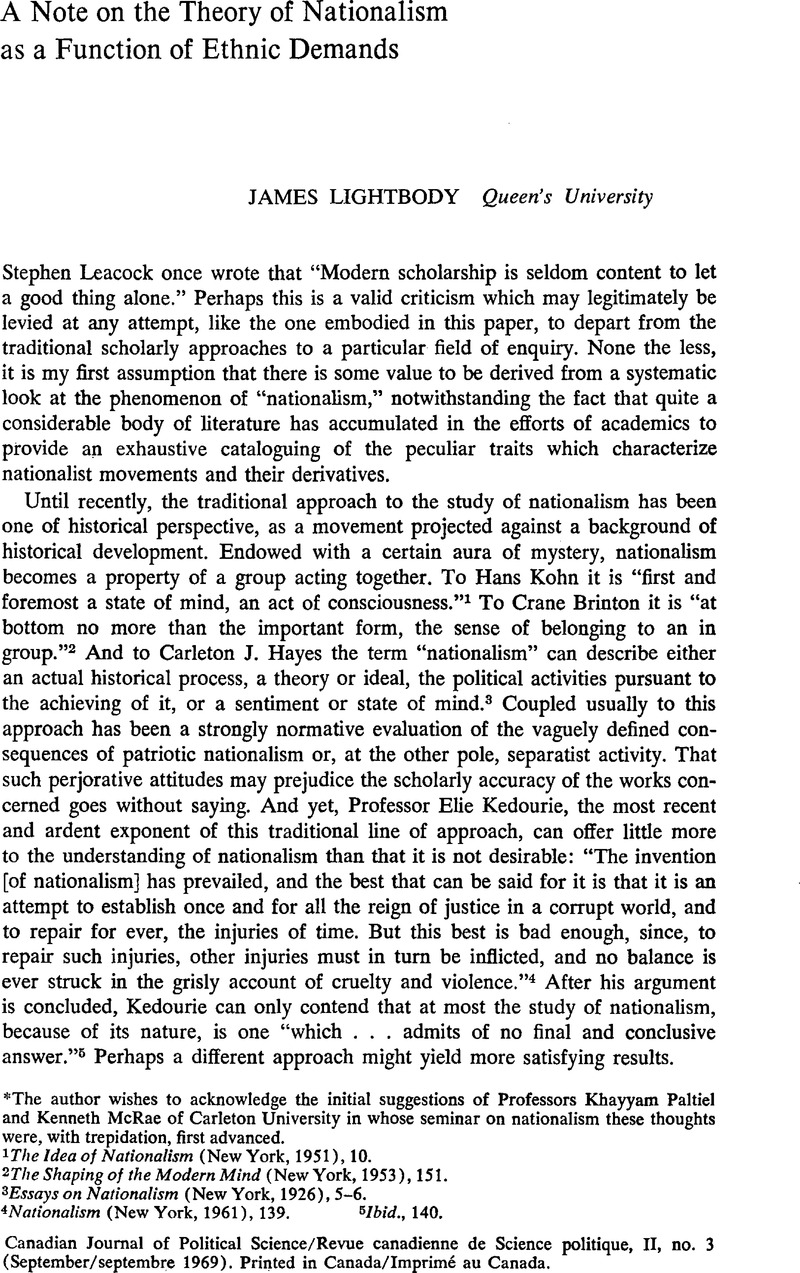Published online by Cambridge University Press: 10 November 2009

* The author wishes to acknowledge the initial suggestions of Professors Khayyam Paltiel and Kenneth McRae of Carleton University in whose seminar on nationalism these thoughts were, with trepidation, first advanced.
1 The Idea of Nationalism (New York, 1951), 10.
2 The Shaping of the Modern Mind (New York, 1953), 151.
3 Essays on Nationalism (New York, 1926), 5–6.
4 Nationalism (New York, 1961), 139.Google ScholarPubMed
5 Ibid., 140.
6 Marxism and the National Question (Moscow, 1950), 16.
7 Barker, Ernest, National Character and the Factors in Its Formation (London, 1927), 17.Google Scholar
8 (Cambridge, Mass., 1955), 2.
9 Kautsky, John, Political Change in Underdeveloped Countries: Nationalism and Communism (New York, 1962), 30.Google Scholar
10 Royal Commission on Bilingualism and Biculturalism, Report: General Introduction (Ottawa, 1967), xxiv.Google ScholarPubMed
11 (Cambridge, Mass., 1953), 104.
12 state and Nation (London, 1964), 33.
13 “Nation-Building in Africa,” in Deutsch, K. and Foltz, W. J., eds., Nation-Building (New York, 1963), 106.Google Scholar
14 The work of David Truman, Earl Latham, and subsequent interest group analysts, for example, is important in suggesting the basis for the mobilizing of effective interest activity. Thus see Truman, , The Governmental Process (New York, 1951)Google Scholar, and Latham, , The Group Basis of Politics (Ithaca, 1952).Google Scholar
15 Almond, Gabriel and Verba, Sidney, The Civic Culture (Boston, 1963), 16–20.CrossRefGoogle Scholar
16 Riker, William, Federalism: Origin, Operation, Significance (Boston, 1964), 7.Google Scholar
17 “Nation and World,” a paper delivered to the Annual Meeting of the American Political Science Association, September 9, 1966, p. 2. The italics are added.
18 Political Unification (New York, 1965), 25.
19 Edelman, Murray, The Symbolic Uses of Politics (Urbana, 1964), 167.Google Scholar
20 Lane, Robert, Political Ideology (New York, 1962), 381–99Google Scholar; Lane, Robert and Sears, David, Public Opinion (Englewood Cliffs, 1964), 40.Google Scholar Both discussions, while not necessarily in this context, emphasize the significance of loyalty to social groupings in providing a focus of orientation for individuals in a society. The impact of primary loyalty to a familiar ethnic group in an unfamiliar “host society” cannot be overemphasized in a discussion of that group's bargaining power.